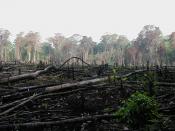Garret Hardin, the author of "The Tragedy of the Commons", studies the natural cycle of humans using non-replenishable resources, and the causes of the cycle. He states that the human population problem is a member of the class of no technical solutions because it is a Tragedy of Commons. Hardin says that "It is fair to say that most people who anguish over the population problem are trying to find a way to avoid the evils of overpopulation without relinquishing any of the privileges they now enjoy. They think that farming the seas or developing new strains of wheat will solve the problem- technologically.... The population problem cannot be solved in a technical way, any more than the problem of winning the game of tick-tack-toe. " My belief is that with more people on earth, the total population would have less time for relaxation or less energy for extracurricular activities, because these leisurely activities wouldn't be available anymore due to overpopulation.
In other words, with the increase of the human population, the quality of life decreases.
The Tragedy of Commons is a problem that arises from the conflict between individual profit versus preservation. The example Hardin uses is that of a herdsman. He states that unconsciously, the herdsman wants looks to increase production by adding more animals to his herd, thus increasing his profit. However, he fails to realize that there also is a cost to the additional overgrazing resulting from the addition of one more animal. Hardin calls this the Tragedy of Commons because "Each man is locked into a system that compels him to increase his herd without limit- in a world that is limited. Ruin is the destination that all men rush, each pursuing his own best interest in a society that believes in the freedom...


